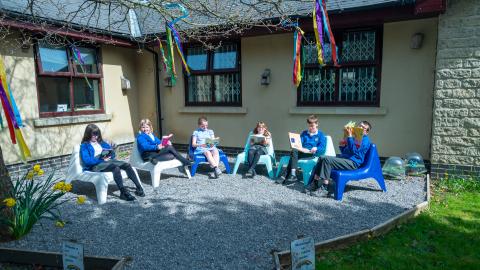Reading
Reading begins in Foundation Stage through sharing books with simple or no text so that the children can learn how to tell a story using images. Children progress through the reading books which are closely linked to the phonics phase currently taught in class. Each book level introduces new reading and comprehension skills. There is an emphasis on children learning to decode through daily phonics teaching and developing their sight vocabulary for common exception words. Parents are encouraged to support their child to develop a love of reading through new parent phonic meeting sessions, class reading advice leaflets, parent/school reading comment books and teachers rewarding children who read at home.
Shared reading sessions start in Reception once the children start phase 2 and children read in small groups with a trained adult. These sessions continue through to the end of Year 2.
Reading is taught through whole class reading sessions, three times a week from Year 3, which aim to teach the children essential skills needed in order to become a confident and fluent reader. Children who fail to progress at the expected rate are supported with an additional reading intervention through our school phonics programme.
- Children are encouraged to explain and justify their thinking when answering comprehension questions.
- Children have opportunities and are taught to work both collaboratively and independently.
- Structured high quality opportunities for speaking and listening are used to develop children’s language skills as well as to support writing and reading.
Systematic Phonics Programme
Little Wandle Letters and Sounds Revised is used to teach phonics across the school. This starts in Nursery with Foundation for Phonics and children then start learning GPCs at the beginning of Reception. Phonics is taught rigorously throughout Reception and Year 1, every day, to ensure all children meet the expected standard in the Phonics Screening Check. A revision of phonics is continued throughout the autumn term in Year 2 until children become fluent readers. They then progress onto our school spelling scheme. Phonics is continually referred to across key stage 2, using Grow the Code mats for spellings and any children who need to continue with small group and one-to-one interventions.
Please see our Phonics page for more details.
Reading for Pleasure
We want all children to love reading! At Settle Primary School, all children, from Reception to Year 6, take two reading books home. One is linked to their reading level (phonetically decodable for younger children or colour-banded for KS2 children) and the other book is a reading for pleasure book which children choose themselves from class libraries. This book is to share with an adult and enjoy reading together to encourage children to be lifelong readers.
Reading Beyond Little Wandle (Year 2 to Year 6)
Once children become fluent in phonics, they progress onto our ‘Lighthouse’ guided reading books in Year 2. Children read together in small groups and enjoy a wide range of texts with an adult. The children are encouraged to ‘read for meaning’, answering key questions about the texts they read.
In Key Stage 2, children read book-banded books independently, closely linked to their reading ability. They will read to an adult in school once-a-week. When they are confident at reading a colour-banded book, they are assessed by a member of staff before they can progress to the next level.
Reading is also taught through whole-class reading lessons up to 3 times-a-week.
Reading Enrichment Opportunities
We want all children to have a love for reading. To support and nurture this, we have a number of whole-school initiatives which include:
- ERIC Time – Each day 10 minutes of dedicated reading time where adults and children read a book for pleasure.
- Whole Class Story Time – Each day the class teacher reads a class reader to the class for enjoyment.
- ‘Reading Buddy Time’ – KS2 classes link up with KS1 and EYFS to share books fortnightly
- Local library visits for every class every term
- Library lending box for Nursery
- Author visits to school
- Celebration of World Book Day
- Development of more whole class reading sessions in KS2 – 3 times a week, following a similar format to KS1 with Little Wandle.
- Teachers use CLPE units or LiteracyShed+ to ensure lessons use high-quality texts and have a bank of ideas and resources to choose from.
Assessment
At the end of every term, children in Year 2 upwards complete a PIRA reading test to check their reading and comprehension skills. These are closely tracked on the schools assessment system and any children who need extra intervention or support are quickly identified and action put in place.

